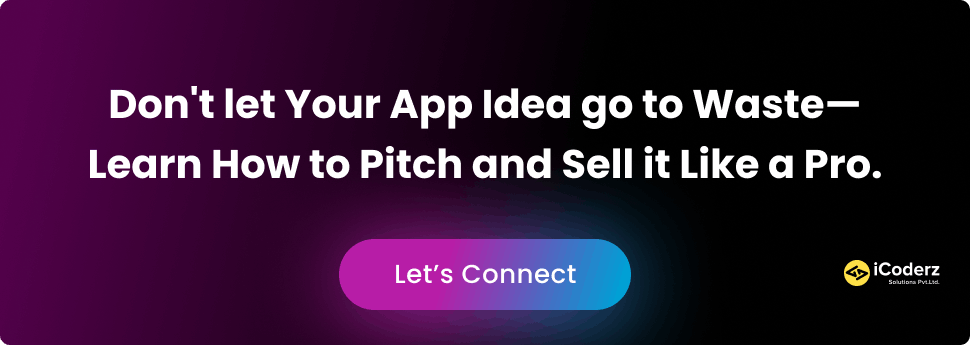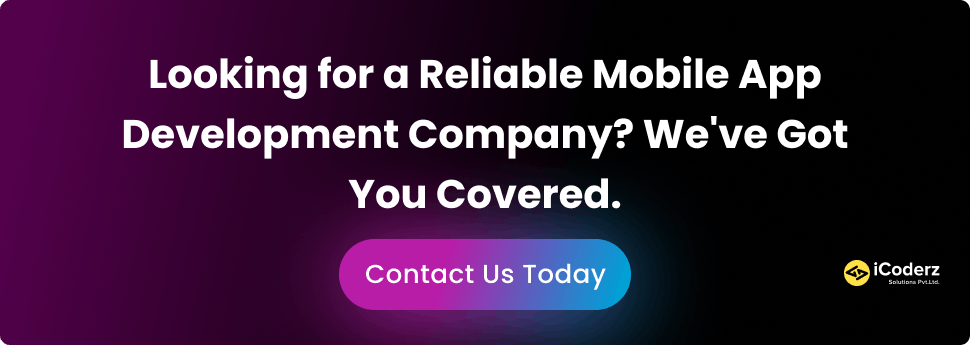Table of Contents
As the world becomes increasingly reliant on technology, Mobile App Development has become a lucrative industry. However, developing an app idea and bringing it to market can be a daunting task. With so many aspiring entrepreneurs vying for success in this space, how do you stand out? In 2024, selling an app idea will require more than just a great product – it will take strategic planning and effective marketing. So, if you’re ready to learn how to sell an app idea like a pro in 2024, keep reading!
How to Sell an App Idea in 2024
There are several different ways on How to sell an app idea.
- Direct Sale: In a direct sale, you negotiate and sell your app idea directly to a buyer or company interested in acquiring it. This approach requires networking, pitching, and establishing direct contact with potential buyers. It can involve negotiations on the terms of the sale, such as price, intellectual property rights, and ongoing involvement in the project.
- Licensing: With licensing, you retain ownership of your app idea but grant a license to a company or individual to use, develop, and market the app. In exchange, you receive licensing fees or royalties based on the app’s performance or sales. Licensing allows you to monetize your idea while minimizing the risks and costs associated with app development and marketing.
ALSO READ: App Development Cost – A Complete Guide
- Partnership or Joint Venture: Instead of selling your app idea outright, you can enter into a partnership or joint venture with a company or individual. In this arrangement, you collaborate to develop and launch the app together, sharing responsibilities, resources, and potential profits. Partnerships can provide access to expertise, funding, and distribution channels that may accelerate the app’s success.
- App Development Companies: Some app development companies are interested in acquiring innovative app ideas to expand their portfolio or offer new services. They may be willing to buy or partner with you to develop and market your app idea. Research and approach app development companies that specialize in your app’s industry or target market.
- Online Marketplaces: Online marketplaces dedicated to buying and selling app ideas, such as Idea Buyer and Sell My App, provide a platform for app creators to showcase their ideas to potential buyers. These platforms offer a marketplace where you can list your app idea and connect with interested buyers who are actively seeking new opportunities.
- Business Brokers: Engaging a business broker specializing in app acquisitions can help you connect with potential buyers and navigate the selling process. These professionals have networks and expertise in app sales, facilitating the identification of suitable buyers and ensuring a smoother transaction. Remember to protect your app idea by using non-disclosure agreements (NDAs) and considering filing for patents or trademarks before sharing sensitive information with potential buyers. Each selling method has its advantages and considerations, so carefully evaluate your goals, preferences, and the potential buyer’s fit with your app idea before choosing the best approach.
Tips and Tricks for Selling an App Idea in 2024
Selling an app idea in 2024 requires strategic planning and effective execution. Here are some tips and tricks to increase your chances of success:

- Refine Your App Idea: Ensure your app idea is well-defined, unique, and solves a specific problem or fulfills a need in the market. Conduct thorough market research to validate the demand for your app idea and identify its unique selling points.
- Create a Compelling Pitch Deck: Craft a visually appealing and concise pitch deck that highlights the value proposition of your app idea. Include key information such as market analysis, target audience, competitive advantage, monetization strategy, and a compelling vision for the app’s future.
- Build a Prototype or Minimum Viable Product (MVP): Develop a prototype or MVP to demonstrate the functionality and potential of your app idea. A tangible product showcases your commitment, validates the concept, and provides potential buyers with a tangible vision of your app.
- Protect Your Intellectual Property: Safeguard your app idea by filing for patents or trademarks, if applicable. Use non-disclosure agreements (NDAs) when discussing your idea with potential buyers to protect your intellectual property rights.
- Create a Strong Online Presence: Establish an online presence through a website, social media profiles, and a professional online portfolio. Demonstrate your expertise and showcase your app idea to potential buyers who may come across your online presence.
- Network and Attend Industry Events: Engage in networking opportunities and attend industry-specific events, conferences, and meetups. Connect with potential buyers, investors, and industry professionals who may be interested in your app idea.
- Research and Target Potential Buyers: Identify potential buyers who are actively seeking app ideas or investing in startups. Research their portfolio, previous acquisitions, and their focus areas to ensure your app idea aligns with their interests and needs.
- Engage with App Development Companies: Reach out to app development companies that specialize in your app’s industry. They may be interested in acquiring app ideas or partnering with entrepreneurs to bring innovative concepts to life.
- Prepare a Detailed Business Plan: Develop a comprehensive business plan that outlines the market opportunity, revenue projections, marketing strategy, and financial considerations. A well-prepared business plan demonstrates your professionalism and enhances your credibility with potential buyers.
- Engage Business Brokers or Consultants: Consider working with business brokers or consultants who specialize in app acquisitions. These professionals have expertise in the field and can provide valuable guidance, connections, and support throughout the selling process.
- Be Flexible and Open to Negotiation: Be open to different types of deals, such as licensing, partnerships, or outright sales. Negotiate terms that align with your goals and ensure a mutually beneficial agreement.
- Focus on Building Relationships: Building trust and maintaining positive relationships with potential buyers is crucial. A good rapport can increase the likelihood of successful negotiations and partnerships. Remember, selling an app idea requires persistence, adaptability, and thorough preparation.
By following these tips and leveraging the opportunities available in the dynamic app market of 2024, you can increase your chances of finding the right buyer and realizing the value of your app idea.
How to Make Money from an App Idea?
Turning an app idea into a profitable venture requires careful planning, execution, and a solid monetization strategy. Here are several approaches you can consider to make money from your app idea:
- In-App Purchases: Offer additional features, content, or virtual goods within your app that users can purchase. This model is effective for apps in gaming, entertainment, or productivity niches.
- Subscriptions: Provide a subscription-based model where users pay a recurring fee to access premium content, exclusive features, or enhanced functionality. This approach works well for apps that offer ongoing value or services.
- Advertising: Incorporate ads within your app to generate revenue. You can choose from various ad formats, such as banners, interstitials, or native ads. Consider partnering with ad networks or utilizing targeted advertising to maximize ad revenue.
- Freemium Model: Offer a free version of your app with basic features and limited functionality. Provide the option for users to upgrade to a premium version with additional features or a better user experience. This strategy encourages users to try your app and then convert them into paying customers.
ALSO READ: Top 30 On-Demand App Ideas to Start Business
- Sponsorships and Partnerships: Collaborate with brands, businesses, or influencers to sponsor your app or integrate their products/services. This can involve cross- promotion, sponsored content, or brand partnerships that generate revenue through sponsorship deals.
- Data Monetization: Collect anonymized user data within your app and offer it to third parties for market research, analytics, or targeted advertising purposes. Ensure compliance with privacy regulations and maintain transparency with users regarding data collection and usage.
- In-App Advertising: Besides traditional ads, consider incorporating rewarded video ads or offer users incentives, such as virtual currency or additional features, in exchange for engaging with advertisements. This approach enhances user engagement while generating revenue.
- Transaction Fees: If your app involves facilitating transactions, such as e-commerce or peer-to-peer marketplaces, charge a small percentage or flat fee for each transaction conducted through your platform.
- White Labeling or Licensing: If your app has a unique feature or technology that can be beneficial to other businesses, consider licensing your app to them or offering white-label solutions. This allows other companies to use your app under their branding, generating revenue through licensing fees or royalties.
- Crowdfunding or Investor Funding: If you need initial capital to develop and launch your app, consider crowdfunding platforms or seeking investment from venture capitalists or angel investors. Present a compelling business plan, prototype, and market analysis to attract potential backers.
How Sell your App Idea to a Company?
Selling your app idea to a company can be an exciting opportunity to bring your vision to life while benefiting from the resources and expertise of an established organization. Here are some steps to follow when approaching a company with your app idea:
Research Potential Buyers: Identify companies that align with your app’s industry, target audience, and vision. Look for companies that have a track record of acquiring or partnering with app developers or startups. Consider their portfolio, market presence, and willingness to innovate.
Protect Your Idea: Before sharing your app idea, take steps to protect your intellectual property. This may include filing for a provisional patent, copyrighting your app design or content, or using non-disclosure agreements (NDAs) when discussing your idea with potential buyers.
Develop a Pitch: Create a compelling and concise pitch that highlights the unique value proposition of your app idea. Clearly articulate the problem your app solves, its target audience, and the potential market opportunity. Include mock-ups, wireframes, or a minimum viable product (MVP) to demonstrate the app’s functionality and user experience.
Find the Right Contact: Research the appropriate individuals within the target company who are responsible for evaluating app ideas or managing partnerships/acquisitions. This may include product managers, innovation officers, or business development executives. Use professional networking platforms, industry events, or personal connections to identify and reach out to the right person.
Make Contact: Reach out to the identified contact via email, phone, or LinkedIn. Introduce yourself briefly, highlight your expertise, and express your interest in discussing a potential partnership or acquisition opportunity. Request a meeting or propose a call to further discuss your app idea.
Present Your Idea: During the meeting or call, present your pitch and be prepared to answer any questions or concerns. Emphasize the market potential, unique features, and competitive advantage of your app. Be open to feedback and suggestions, as companies may have their own ideas for collaboration or enhancements.
Negotiate and Protect Your Interests: If the company expresses interest in your app idea, be prepared to negotiate the terms of the agreement. This may include financial compensation, intellectual property rights, ongoing involvement, or future revenue sharing. Seek legal advice to ensure that your interests are protected and that the terms of the agreement are fair and favorable.
Formalize the Agreement: Once both parties have reached an agreement, it’s important to formalize the arrangement through legal contracts, such as a partnership agreement, acquisition agreement, or licensing agreement. Ensure that all terms, rights, and responsibilities are clearly documented to avoid misunderstandings in the future.
Pitching Your Mobile App Ideas to the Right Investors
When seeking investment for your app idea, targeting the right investors is essential. Finding investors who align with your industry, vision, and stage of development increases your chances of securing funding. Here are some potential investors to consider:
Venture Capital Firms:
Venture capital firms specialize in funding early-stage startups with high growth potential. Consider approaching firms like:
- XYZ Ventures: Known for their investments in the technology sector, XYZ Ventures has a portfolio of successful mobile apps and a keen interest in innovative consumer solutions.
- VentureFund Partners: With a focus on disruptive technologies, VentureFund Partners seeks early-stage startups with scalable app ideas in emerging markets.
Angel Investors:
Angel investors are high-net-worth individuals who provide capital and mentorship to startups. Some prominent angel investors in the tech industry include:
- Sarah Johnson: As a serial entrepreneur with a passion for mobile apps, Sarah has a track record of investing in and advising successful app startups. Her expertise lies in consumer-facing applications with a strong user experience.
- Mark Roberts: Known for his investments in the mobile technology sector, Mark has a particular interest in apps that leverage artificial intelligence and machine learning to deliver innovative solutions.
Large corporations often have venture arms that invest in startups relevant to their
industry. Consider reaching out to:
- InnovationCo: Known for their investments in tech startups, InnovationCo is actively seeking partnerships with app developers who can enhance their existing product offerings or provide new solutions in their industry.
- IndustryCorp Ventures: Focused on funding disruptive startups in specific sectors, IndustryCorp Ventures is particularly interested in apps that can drive digital transformation within their industry.
Crowdfunding Platforms:
Crowdfunding platforms offer a unique way to raise funds by tapping into a collective community. Platforms such as:
- FundStart: With a dedicated tech-focused user base, FundStart attracts investors looking to support innovative app ideas. Their platform offers exposure to a broad network of potential backers.
When approaching investors, tailor your pitch to address their specific investment interests and portfolio. Highlight the market opportunity, unique features, and monetization potential of your app. Clearly articulate how their investment will accelerate the growth and success of your project.
Benefits of Selling an App Idea in 2024
In 2024, there are numerous benefits to selling an app idea. Let’s dive into some of the key advantages:
Financial Gain: Selling an app idea can be highly lucrative. If your idea resonates with investors or potential buyers, you can secure a substantial financial return. Depending on the uniqueness and potential of your app concept, you may be able to negotiate a favourable deal that brings you a significant profit.
Access to Resources: When selling your app idea, you often gain access to a network of experienced professionals, including developers, designers, marketers, and business strategists. These resources can greatly enhance the chances of your app’s success. Collaborating with a well-established company or investor can provide the necessary funding, expertise, and infrastructure to turn your idea into a reality.
Reduced Risk and Time Commitment: Developing and launching an app can be a complex and time-consuming process. By selling your app idea, you transfer the burden of execution and operational tasks to the buyer. This allows you to mitigate risks associated with funding, development hurdles, and market adoption. Instead, you can focus on new creative ventures or explore other opportunities.
Market Validation: Selling your app idea confirms its market potential. When a buyer shows interest and is willing to invest in your concept, it serves as validation that your idea is valuable and has the potential for success. This validation can boost your confidence, build your reputation as an innovator, and open doors for future collaborations or opportunities.
Learning Experience: Engaging in the process of selling an app idea provides a valuable learning experience. You’ll gain insights into the market dynamics, investor expectations, negotiation tactics, and the overall app development and sales process.
This knowledge can be applied to future endeavours and improve your ability to
generate innovative ideas or pursue entrepreneurial ventures.
Intellectual Property Protection: Before selling your app idea, you will likely enter into a non-disclosure agreement (NDA) or other legal arrangements that protect your intellectual property rights. These agreements ensure that your idea remains confidential and cannot be exploited without your consent. This safeguard provides you with peace of mind and preserves the value of your intellectual creation.
Opportunities for Collaboration: Selling your app idea often opens doors for collaboration with industry experts, investors, or established companies. Through these collaborations, you may have the chance to contribute your expertise, provide input, or even work on the app’s development as part of the buyer’s team. Such collaborations can broaden your professional network, provide mentorship opportunities, and pave the way for future entrepreneurial endeavours.
Remember, selling an app idea requires careful consideration of the terms and conditions, including intellectual property rights, revenue sharing, and future involvement. Consulting with legal professionals or advisors is highly recommended to ensure a fair and beneficial agreement for all parties involved.
Conclusion
Selling an app idea in 2024 is no easy task, however, with a bit of research and strategic planning, it can be done. We hope that this guide has provided you with the tips and resources necessary to create a successful pitch for your app concept. By leveraging connections within the tech industry, creating a unique value proposition, and finding ways to differentiate yourself from competitors, you are sure to make strides towards selling an Mobile App Ideas in 2024.





